What kind of global expansion is CoMix Wave Film, the production company behind Makoto Shinkai's works, undertaking?

At '
How far can anime go? CWF's global adventure - Machi Asobi
https://www.machiasobi.com/stage/164/
Moderator Noriyoshi Kawaguchi (hereinafter, Kawaguchi):
Welcome, everyone. I'm very grateful that you came to such a mundane and confusing event. Are you interested in hearing about how Japanese anime is competing overseas?
(Strong reaction)
Kawaguchi:
Thank you. Are you interested in how Makoto Shinkai is doing, or how Japanese anime as a whole is doing? Or both?
(Several people in the audience responded, 'Both!')
Kawaguchi:
Oh, that's perfect. Let me introduce myself. I'm Kawaguchi from CoMix Wave Films, and I've been asked to be the moderator. I'm now the chairman. I look forward to working with you.
Mie Onishi (hereinafter, Onishi):
My name is Mie Onishi, and I am an advisor for the overseas business department of CoMix Wave Films. I look forward to working with you.
Aoi Ishimaru (hereinafter, Ishimaru):
My name is Ishimaru, and I am the chief of the overseas business department at CoMix Wave Films. Nice to meet you. I'm sure you all know what kind of company CoMix Wave Films is, but...
(Applause from the audience)
Kawaguchi:
Our company basically takes 3-4 years to make one of Makoto Shinkai's films. We work with STORY and Toho, and have an overseas business department, so we deal directly with Korea and India, and in other regions we work with Toho and travel around the world.
Ishimaru:
Let me introduce how Director Shinkai's last three films fared overseas in terms of box office revenue. ' Your Name ' was a hit in Japan, grossing 25 billion yen, and was also a hit overseas, becoming the No. 1 Japanese film in terms of worldwide box office revenue at the time.
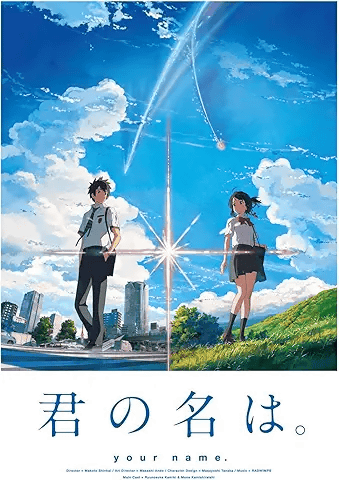
Ishimaru:
The next

Ishimaru:
In 2022, '
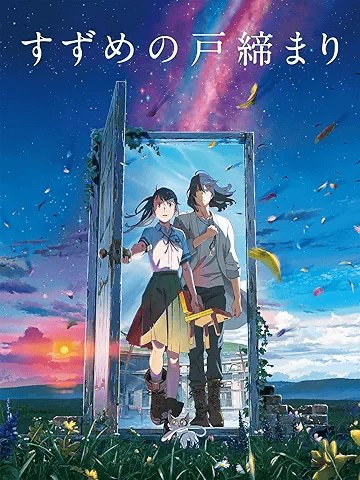
Ishimaru:
In terms of worldwide box office revenue, 'Sparrow's Door Lock' is currently the No. 1 film.
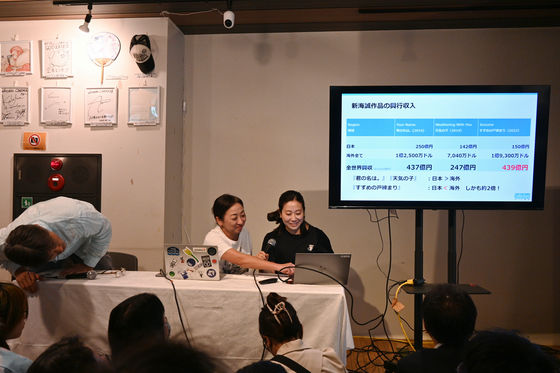
Kawaguchi:
That's amazing!
(Applause from the audience)
Ishimaru:
Moreover, the number of countries and regions where the films are distributed is increasing with each film, with 'Your Name' being distributed in 135 countries and regions, 'Weathering With You' in 144, and 'Sparrow's Door Lock' in 199, meaning that the films have been released in almost all countries and regions around the world.
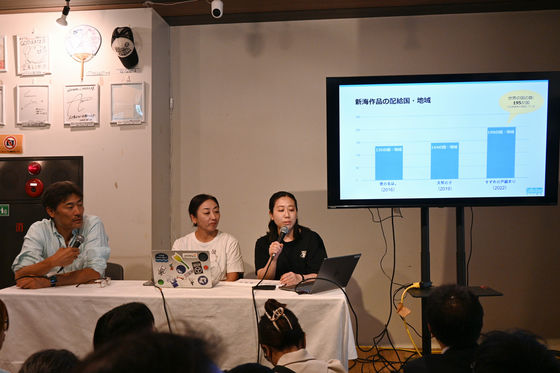
(Applause from the audience)
Kawaguchi:
Makoto Shinkai is amazing.
Ishimaru:
I would like to show you a video of what kind of world tour we went on for 'Sparrow's Door Lock.'
(Video screening)
Kawaguchi:
Baseball is popular in America and Japan, but not so much in Europe and other regions, so I think that on a global scale, 'Shinkai' is probably more famous than 'Otani.'
Ishimaru:
The world tour for 'Sparrow's Door Lock' took them to 13 cities in 9 countries over a period of three months.
Kawaguchi:
It's because it's an anime that it's been invited all over the world. It's the same in Japan, but people gather just because 'Makoto Shinkai is coming.' In the midst of all this, he first participated in the Berlin International Film Festival, and then spent about a month traveling around several countries, going east and west, and waking up in the morning wondering 'where am I?', while Mako-chan (Makoto Shinkai) was doing interviews and giving stage greetings from morning to night. He interacted with fans from all over the world there, and he says he will use that experience in his next work.
Ishimaru:
This time, I would like to introduce some examples from two countries that have a close connection to Mr. Onishi and I.
Onishi:
Mr. Ishimaru is from India and I'm from America.
Ishimaru:
First, let me introduce myself. I am actually a newbie who just joined CoMix Wave Films in January of this year. Before that, I worked for
I was planning various events in India, and one of them was the ' Japanese Film Festival ' that introduced Japanese films. I decided to invite Director Shinkai in 2019, and that's when I met everyone from CoMix Wave Films for the first time. I don't know if you're familiar with the Indian film market, but domestic films are overwhelmingly strong in India. You may have heard of the word 'Bollywood,' but there are other famous film industry areas all over the country.
Kawaguchi:
It's like four Hollywoods.
Ishimaru:
That's why even American Hollywood movies don't make it into the top 10.
Kawaguchi:
It's amazing that even Spider-Man hasn't made it in. Japan is a unique market, though.
Ishimaru:
Yes, for example, in 2023, ' The Super Mario Bros. Movie ' was a hit all over the world and made it into the top 10 in Japan, but it didn't even make it into the top 10 in India. By the way, movie ticket prices are completely different in India and Japan, but the market is roughly the same, about 200 billion yen per year.
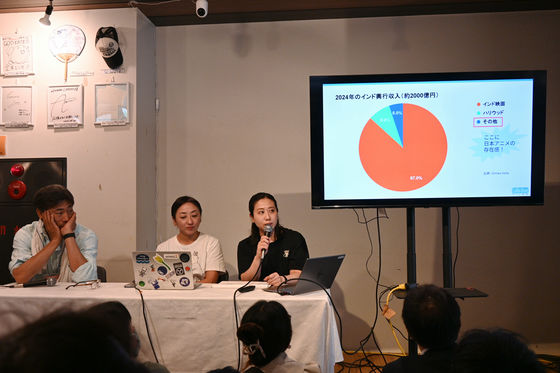
Kawaguchi:
It usually costs about 2,000 yen in the city, but the further you go into the country, the cheaper it gets. It's the same in China, but it's probably only 100 yen at the end of the line. Also, they do things like dynamic pricing, where it's expensive on the first day, but gets cheaper and cheaper after about a month.
Ishimaru:
So, the current situation in India is that domestically produced Indian films make up 87% of the market, Hollywood makes up 8%, and others make up 5%. So, let's talk about why 'Weathering With You' was released in India. In fact, 'Weathering With You' is the first Japanese film to be released nationwide in India.
Kawaguchi:
Until then, a Japanese film had never been shown all over India.
Ishimaru:
The Japanese film '
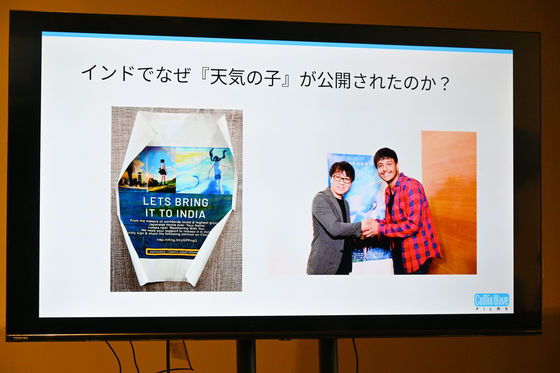
Ishimaru:
'Your Name' hadn't been released in India, but for some reason it was very popular... I think people were probably watching it on illegal sites.
(Audience laughs)
Ishimaru:
I made Hindi subtitles and dubbed it on my own, and many people watched it, and it was very popular, but it was not released. I really wanted to see Director Shinkai's next work, 'Weathering with You,' in the theater. If I didn't watch it in the theater, Director Shinkai and the creators at CoM Wave Films wouldn't get any money, so a high school student started a petition saying, 'We want to give back to the creators as fans,' and 56,000 signatures were collected. At the time, I was in India, and one day a young Indian came to visit me, showed me this poster, and said, 'Please put this up. I want to bring 'Weathering with You' to India.' At first, I thought, 'Is that impossible?' But he had such pure and sparkling eyes, and I wanted to do something for him, so I contacted CoM Wave Films, even though I didn't think it would work. I asked him, 'This is what's happening in India right now. Can you do something about it? There's a film festival, can you come to the director?' and Director Shinkai actually came to India. It was an unforgettable event for Indian anime fans.
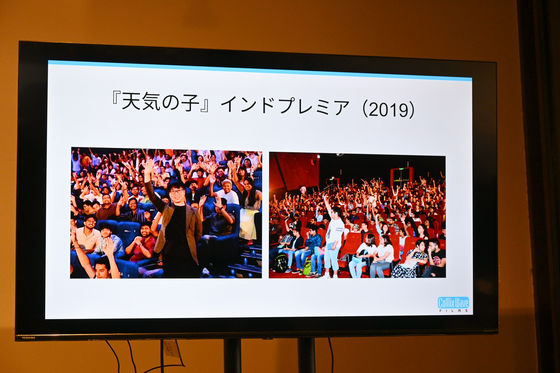
Kawaguchi:
For some reason, the Indians call out 'Shinkai! Shinkai!' without even using their first names (laughs), and they even stand up and come up to the stage. In India, it's customary to touch the feet of people you respect, so everyone touches his shoes.
(Exclamations)
Kawaguchi:
I remember that we watched 'Your Name' and 'Weathering with You' together, and the Indians stood up to cheer. First, we stood up in the cinema and sang the national anthem, then sat down to watch the movie, but for example, at the climax of 'Weathering with You', when the two characters hold hands, they stood up and shouted 'Waah!!!' I thought, 'Is that what Shinkai's works are like? Aren't they supposed to enjoy the feeling after reading it?' (laughs), but it was really shocking to see people shouting their love while watching like that. Makoto Shinkai also liked it a lot, and when I said, 'I'd like to come back for your next film,' he said, 'Waah!'
Ishimaru:
After this premiere, Weathering With You was released in 38 cities in India and became a huge hit. The distributor, who had never released an anime before, was surprised, saying, 'It's been received so well!?' Since it was also in the news in Japan, we received a lot of calls saying, 'Please show our movie too,' and other anime works began to be released in India one after another. This is the same with
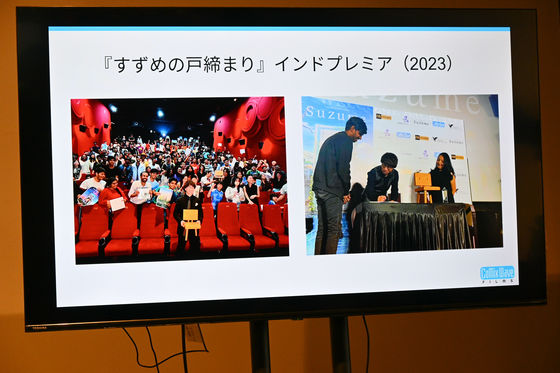
Ishimaru:
'Sparrow's Door Lock' broke the box office record for a Japanese film in India, becoming the first to reach 100 million rupees. Converted into Japanese yen, that's roughly 170 million yen, and it has yet to be broken. I'm sure you're not sure if this is a big deal, but in India, a film that makes 1 billion rupees is considered a hit, so this is about one-tenth of that. 'If an Indian domestic film makes 1 billion rupees, it's considered a hit,' so we've come quite far, and expectations are high for our next film.
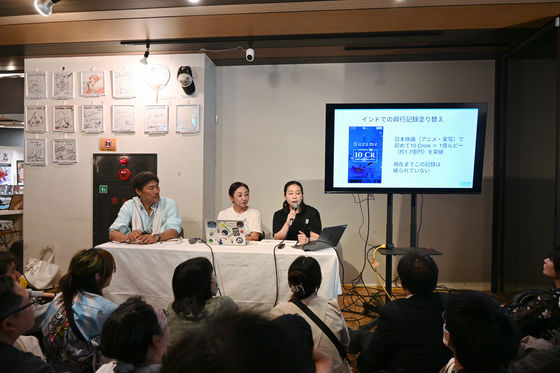
Ishimaru:
I think the reason why 'Sparrow's Door Lock' became such a hit is because they valued the fan community so much. India is very large, and there are clubs run by volunteer anime fans all over the country. At the film festival, we invited club leaders from all over the country to the premiere of 'Sparrow's Door Lock' and held a social gathering with Director Shinkai. Everyone was very happy to be able to ask questions to Director Shinkai directly and hear his answers.
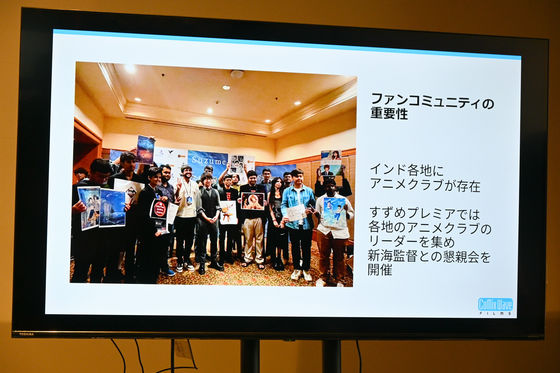
Ishimaru:
Events are increasing in number all over the country, and this is a photo of '
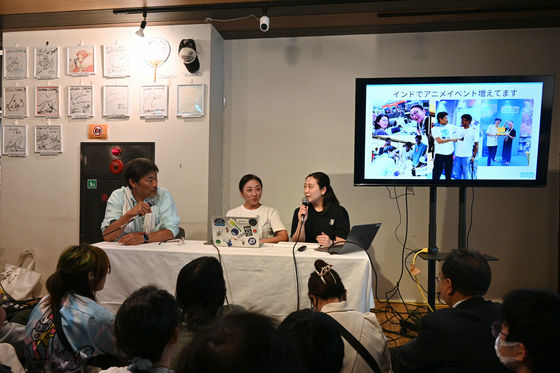
Kawaguchi:
It was really exciting.
Ishimaru:
It was the first event, and about 60,000 people gathered over the two days, which was quite surprising.
Onishi:
It was my first time in India.
Kawaguchi:
When I was there, people spoke to me in Japanese, which was a really refreshing experience.
Ishimaru:
There are still pirated copies circulating in India, but we wanted to show the real thing and make people happy.
Kawaguchi:
This was last year, when was it?
Ishimaru:
It's September.
Kawaguchi:
After that, I was told, 'Ishimaru-san is coming to our house,' and I thought, 'Seriously?!' But why did he come to our house? Was he thinking about going back to Japan soon?
Ishimaru:
Yes, well, I'd been there for quite a while so I was starting to feel like it was time to go home.
Kawaguchi:
Did you have any specific catchphrases? Whenever I try to catch someone, I say, 'Let's make the world peaceful together with Makoto Shinkai.'
(applause)
Kawaguchi:
The Japan Foundation is a proper organization under the Ministry of Foreign Affairs, so I was surprised that he wanted to join us.
Ishimaru:
I've been doing a lot of things since 2019, including events in India, and the fans who watch Director Shinkai's work are shining with joy. I want to deliver more of these works and make everyone happy, and I think that only CoMix Wave Films can do that. I wanted to spread it not only to India, but to more countries overseas. I'm an otaku, too.
Kawaguchi:
Yes, I am an otaku. I used to do things like the Haruhi dance.
Ishimaru:
That happened too (laughs). 'I also want to bring smiles to people all over the world through anime. I thought we shared the same desire, so I joined the company.
Kawaguchi:
Japan's presence overseas has been declining, and for example, 10 or 20 years ago there were many Japanese company signs lined up in Hong Kong, but now most of them are Korean or Chinese companies, so I think the only things Japan can be proud of are anime, manga, and games. I think it was a good choice to come into that industry.
Ishimaru:
Let me also briefly introduce my ambitions. I made and released 'Sparrow's Door Lock', but I would like to make Hindi dubbed versions of 'Your Name' and 'Weathering with You'. About 10% of people in India can speak English, which is 10% of 1.4 billion people, so about 140 million people. About 500 million people speak Hindi. Although it resonates with those who understand English, I would like them to be able to watch it in Hindi, their native language. And another thing is that I would like to make and sell goods that suit the tastes of Indians.
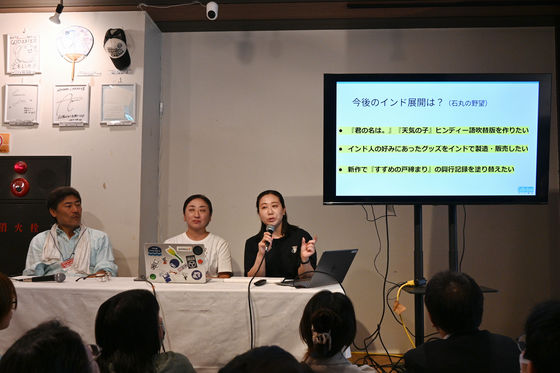
Onishi:
By the way, what kind of image do you have of 'Indian tastes'?
Ishimaru:
In terms of a T-shirt, it's like having a character's face right on your chest.
(Audience laughs)
Ishimaru:
I'm currently working on making a film that emphasizes 'impact' over 'stylishness.' The last one is that I want to break the box office record set by 'The Sparrow's Door Lock' in India with my new film.
(applause)
Kawaguchi:
Thank you for your hard work, Ishimaru-san.
Onishi:
After Bollywood, I would like to talk about Hollywood. This time, I was updating my self-introduction materials and I thought, 'It's been 25 years already.' I've been in this industry for about 25 years. I started out at a company called Universal, buying foreign films, then gradually moved into Japanese film production, and then shifted to animation. My previous job was at Marza Animation Planet, a company in the Sega Sammy Group, and most recently I produced '
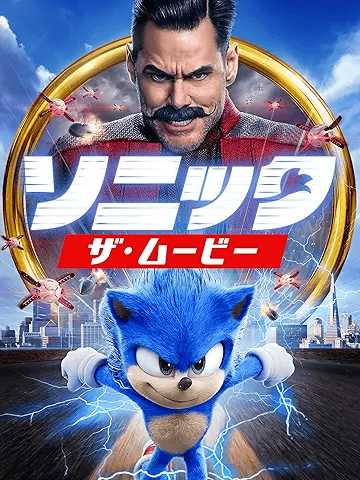
Kawaguchi:
Sonic took a really long time.
Onishi:
If I were to talk about that, I wouldn’t have enough time (laughs).
(Audience laughs)
Kawaguchi:
But thanks to that, he is one of the few people in Japan who has proper connections in Hollywood. And now he lives in Tokushima.
Onishi:
That's right, I currently live in Tokushima.
(Applause from the audience)
Kawaguchi:
He attends meetings of our overseas business department and is doing an excellent job.
Onishi:
I've arranged Director Shinkai's works in accordance with my own timeline. Do you know what happened during Director Shinkai's brief break?
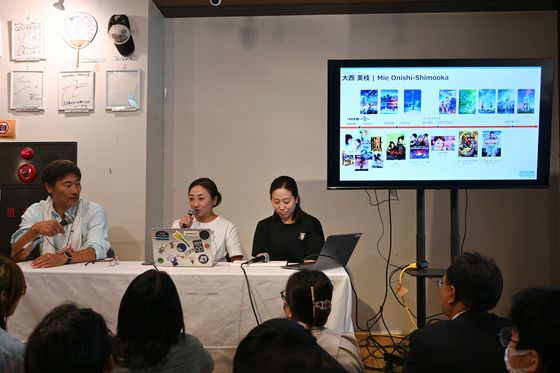
Kawaguchi:
Between '5 Centimeters per Second' and 'Children Who Chase Lost Voices'.
Onishi:
This was during the time when Director Shinkai was studying abroad in the UK. My first encounter with Shinkai's work was '
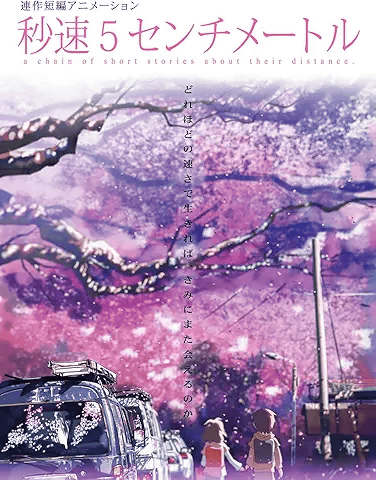
(Audience laughs)
Onishi:
I was so moved that I ran up to Mr. Kawaguchi, and that's how we met.
Kawaguchi:
It was Universal back then.
Onishi:
That's right. I also met Director Shinkai in London.
Kawaguchi:
Mako-chan suddenly said he was going to London, and I thought he'd be back in about three months or six months, but he ended up being gone for over a year.
(Audience laughs)
Kawaguchi:
I would go to London about once every three months to pressure her to come back, but the more I tried, the less likely she was to come back (laughs). I was thinking of doing '
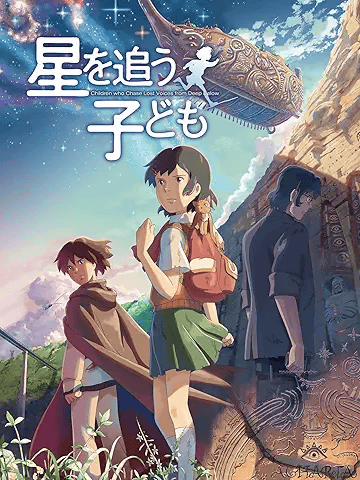
Onishi:
But I couldn't do that, and I ended up causing trouble for Kawaguchi-san... Looking back, I wondered why I started working in animation, and I realized it was because I was moved by Director Shinkai's work and wanted more and more people to see this amazing talent.
Kawaguchi:
I'm asking her not to sell but to make it, and she's helping me start from the script. The photo on the bottom right shows us having a script meeting at a cafe in Beverly Hills. It was really hot...
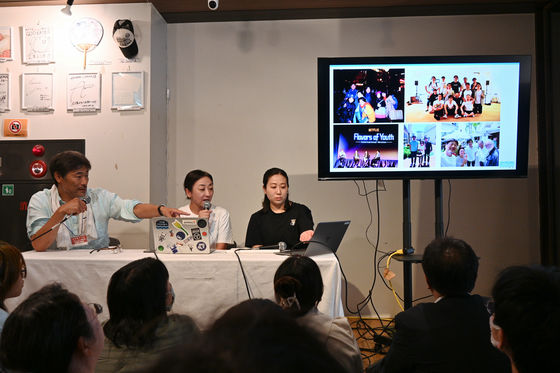
Onishi:
Hey, by the side of the road.
Kawaguchi:
I was so close to falling over (laughs). The person on the bottom left was at a Netflix event and he came right away when I asked him. He knows everything about us and Makoto Shinkai, and translates into English on the spot, which is better than having a full-fledged interpreter come, so we've been friends for a long time.
Onishi:
So after I came back from Hollywood, I stayed in Tokyo for a while, but then COVID happened, so I came back to Tokushima. I worked on Tokushima Toyota's 80th anniversary mascot,
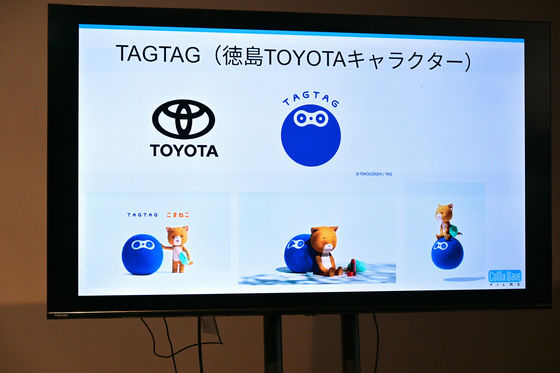
Kawaguchi:
That's where you should clap, TAGTAG!
(Audience laughs and applause)
Onishi:
Thank you very much (laughs). It is being created by Asao Tokolo, who created the Olympic logo, and I am helping him turn it into a character. Also, last month it was announced that a film version of Matsumoto Taiyo's masterpiece ' Sunny ' will be made, and we will be taking it to the Cannes Film Festival. There will be a presentation space set up for five works, and we will be making presentations together with
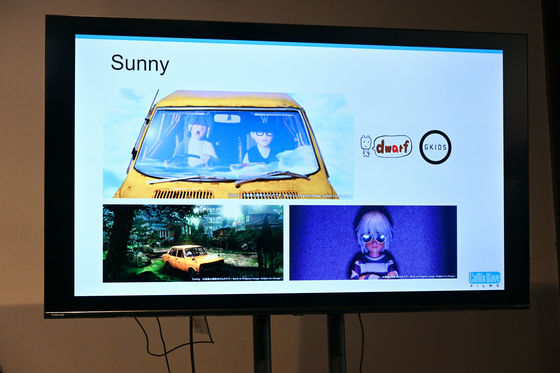
Kawaguchi:
Since this is a dwarf, is it stop motion?
Onishi:
The stop-motion film is directed by Michael Arias, who also directed
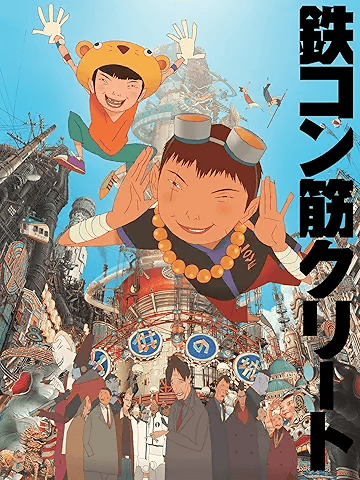
Kawaguchi:
Michael Arias gives me the feeling of CG, but it's super analog and super physical. Stop motion is the opposite of AI, so I think it's going to be the next big thing. I think it will be a strong option for Takarazuka and Kabuki in the future. The distributor is
Onishi:
That's right. And one more thing...
Kawaguchi:
Do you know ' HIDARI '?
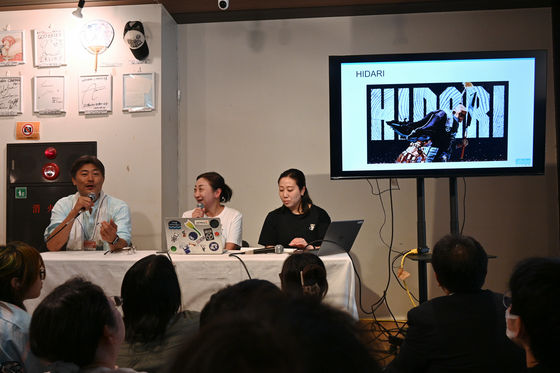
(With reaction from the audience)
Onishi:
Thank you. I would like you to take a look at the video for about 30 seconds.
Onishi:
It's incredible how they move wooden dolls.
Kawaguchi:
That blood splatter is sawdust.
Onishi:
Yes, it's real sawdust. I'm thinking of making this into a feature-length film. Actually, I took it to Hollywood two months ago and I can't say anything yet, but I think I might be able to make an interesting announcement soon. I hope that those who have seen it here will remember it and think, 'That's it!' when something comes out. As for my efforts, I want to create a place for people who want to make new things, so I've started the ' Shibuya Pilot Film Festival ' which focuses on pilot films. I want to create a place to show things that have been made but didn't work out, or things that I'm going to make in the future, like 'HIDARI' that I mentioned earlier. It was very well received in 2024, so I'm thinking of doing it again this year.
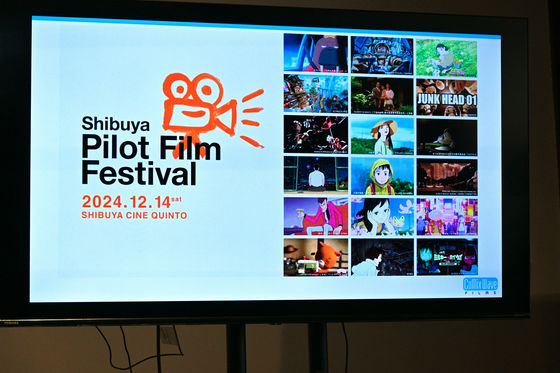
Kawaguchi:
It's
Onishi:
Another initiative is the recent wildfires in Los Angeles, which left many people affected. Many animation creators live in the areas where the wildfires occurred, and many of my friends' houses were burned down. So, all the animation companies in the United States have come together to launch AnimAID, which is working to provide support. In Japan, we have also launched AnimAID Japan, which is doing crowdfunding on Makuake.
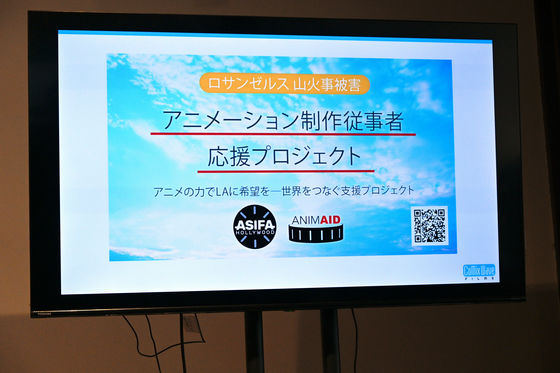
[Los Angeles Wildfire Damage] Animation Production Support Project | Makuake - Support Purchase Service for New Products and Experiences
Onishi:
... Enough with the advertising, let's get back to the topic of Hollywood. Did you know that Hollywood is actually the name of a place in America? It's like Sumiyoshi in Tokushima City (lol)
(Audience laughs)
Kawaguchi:
Do you know what Hollywood means? Maybe it would be better to say 'Hollywood movies.' Like 'Spiderman' or 'MCU.' I'm 56 years old now, and when I was in high school, I didn't go to see Japanese movies, and it was mostly Hollywood movies, but kids these days aren't like that. Disney Pixar is a Hollywood movie, but I'll probably watch a Disney Pixar movie. Are the recent Disney Pixar movies good?
(The audience gives a vague response, 'Uh, um.')
Kawaguchi:
...That's what I'm talking about (laughs).
Onishi:
The weather in that area is good, there isn't much rain, and it's a location with mountains, the sea, and flat land, so it was inevitable that the film industry would develop there. People gathered there, so-called major studios were born, and over the course of about 100 years it became a mecca for film.
Kawaguchi:
I think the image is that people from the UK started to develop the West, and Hollywood was first established by Jews. There are a lot of Jews in the industry, like J.J. Abrams.
Onishi:
I'll talk about that later (laughs). When you open the lid, it's the Jews who are in charge. Doesn't Hollywood have a glittering image? At least that's the image I had, but this glittering Hollywood has been a bit down lately... What's going on is the recession and the effects of COVID-19, and also the double strike by the Writers' Union and the Actors' Union.
Kawaguchi:
You've heard of strikes.
Onishi:
It was hard to make movies, and everyone was exhausted. At the same time, have you heard 'Oscar So White' a while ago? It was said that only white men choose the Academy Awards. And then there was the #MeToo movement. That's what happened, and as a result of taking it too seriously, there was something like 'political correctness going too far.'
Kawaguchi:
Even in anime, there are always Hispanic, black, and Asian characters. There are times when you wonder, 'Why is there an Asian character here?'
Onishi:
With this background, it was particularly amazing for a while. But it was too much of a reflection of that, and the works didn't become hits. People were getting a bit tired of superhero movies, and they were losing steam... The latest work, ' Thunderbolts* ,' is said to have made a bit of a comeback.
Kawaguchi:
Did you see 'Thunderbolts*'? What did you think?
(A comment from the audience said, 'This is the best one this year, so even if you don't know the previous series, it's okay.')
Onishi:
It seems to be recommended.
Kawaguchi:
So maybe it's picked up a bit.
Onishi:
Also, recently, President Trump announced that he would impose a 100% tariff on foreign-produced movies, causing a stir around the world. I wonder what will happen, but I don't think it will be a problem in itself.
President Trump announces intention to impose 100% tariffs on films made outside the US - GIGAZINE

Kawaguchi:
It's the usual thing where you raise it once and then lower it.
Onishi:
Yes. But then, why did I say that? It's because you guys are the reason Hollywood is so exhausted, so I think it's connected. From the time when Hollywood movies dominated the world market, international works are now thriving.
Kawaguchi:
Right, can you explain a bit about the difference between the words global and international?
Onishi:
Ah, I see. Well... the word 'global' used here is a one-way message from Hollywood to the world, but 'international' is an image of something that goes back and forth in both directions around the world. This is just an image, but I feel like America is saying things like 'Everyone, eat a Big Mac!', and the market, tired of that, responds with 'Oh, no, we also have sushi?', and everyone is starting to think, 'Oh, we have this too, it's delicious.' This is a big change, and I think this wave will continue, and I think it's also reflected in the Academy Awards. Have you seen ' Flow '?
(With reaction from the audience)
Onishi:
Have you seen it? The cat was cute, wasn't it? It was released in Japan and apparently made about 160 million yen, but this year these five films were nominated for the Academy Awards, and Flow was the winner. If this had happened five years ago, I'm sure it would have been Rose of the Wild West . It was produced by Dreamworks and distributed by Universal, but it seems that the people who made it were also convinced that it would win. However, in a twist of events, Flow won. Flow is a work by a Latvian director.
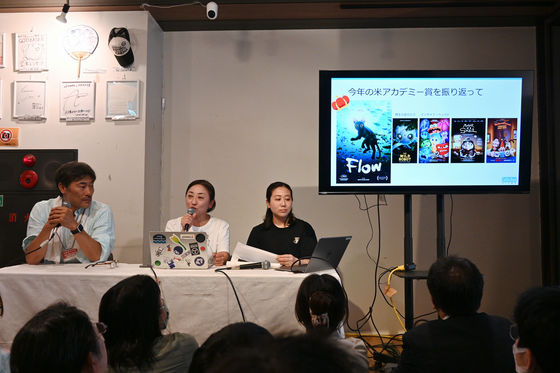
Kawaguchi:
'I thought it would win,' you say, because Hollywood is a small 'village.' We are treated as foreigners after all. Hollywood has long been dominated by Jews, and there has been a history of films not being nominated unless they use one of the top five distributors. Shinkai Makoto's works, such as 'Your Name,' were not nominated because the distributor was Funimation. If we had entrusted the distribution rights to Sony Pictures, they might have been nominated. With such political issues, when she said, 'I think 'Ross of the Wild Island' will win,' that means that there was such an atmosphere. The fact that 'Flow' won in that environment means that the voters voted with all their hearts.
Onishi:
The number of voters, or people with voting rights, has increased tenfold in the past five years, but originally the Academy Awards were decided by a small group of Hollywood 'villages' with fewer than 1,000 people voting. Then, there was the 'Oscar So White' movement, and the system was criticized, leading to a review, and now the number is around 10,000.
Kawaguchi:
The number of Japanese people has increased considerably.
Onishi:
I think there were about 40 people. If you are nominated, you get the right to vote unless you say 'No,' so I think things have really changed. If you look at the award-winning works of the past 10 years, it has always been Disney Pixar that has won, but in 2023, around the time that '
Kawaguchi:
So, what we call international works.
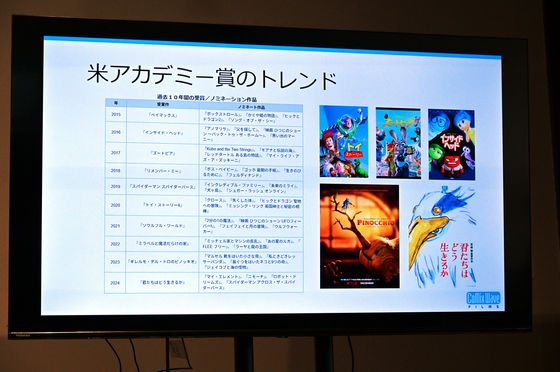
Onishi:
I think that such works are attracting attention. The live-action film '
Kawaguchi:
Over 3 times more!
Onishi:
The number of people who are a little confused is becoming a little confusing. At the same time, overseas remakes of Japanese anime and anime remakes of overseas IP are also popular. For example, ' One Piece ' on Netflix.
Kawaguchi:
That was amazing.
Onishi:
Also 'One Punch Man', 'NARUTO', and 'Your Name'... Wait, 'Your Name' is going to be remade, right?
'Your Name.' Hollywood live-action version produced by J.J. Abrams, script by Eric Heisserer of 'Arrival' - GIGAZINE

Kawaguchi:
When will the script be ready? When will the contract be signed? It's a baptism of fire in Hollywood. Meanwhile, '5 Centimeters per Second' is progressing smoothly and will soon be completed. '5 Centimeters per Second' has won the title of the first live-action adaptation of Makoto Shinkai's work. Well, Hollywood is a bit different from Japan in that it takes '10 years to make a decision.'
Live-action movie '5 Centimeters per Second'
Onishi:
There are also animated versions of Star Wars, Scott Pilgrim, and The Lord of the Rings.
Kawaguchi:
There are just too many titles to watch, I can't watch them all. I have to watch Japanese anime and read 'Jump' too.
Onishi:
That's right... That's why it's not a good idea to turn everything into an anime. Anime is just one method, not a genre. But what I hate these days is that when I talk to people in Hollywood, they ask me, 'Can't you make this into an anime?' What they mean behind that is, 'It's cheaper if it's an anime,' and it really pisses me off.
Kawaguchi:
So annoying!
Onishi:
'It would cost 20 billion yen to make it live-action, so can't we make it as an animation?'
Kawaguchi:
Please tell them I said, 'For anime, it'd be 30 billion!'
(Audience laughs)
Onishi:
Okay, I'll let you know (laughs).
Kawaguchi:
Hollywood creators are also fans of Mamoru Oshii and Makoto Shinkai, so many of them would like to try making a movie in the Japanese anime style at least once.
Onishi:
When you think about it that way, there's a theory that the so-called 'global market' I mentioned earlier may no longer exist.
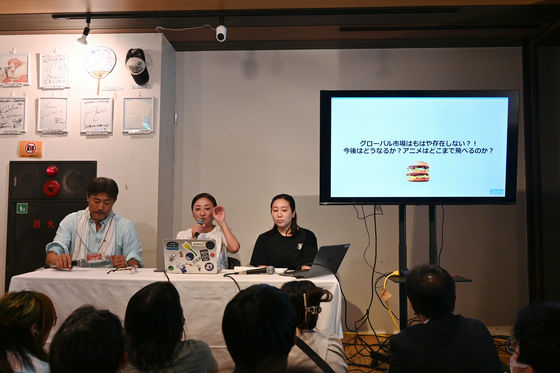
Kawaguchi:
That's the kind of world and era we live in. In the past, if a movie was a big hit in America, it would then become a hit in France and Japan, and make 100 or 200 billion yen globally.
Onishi:
I think the era of Hollywood exporting everything one-way is over, and since we are in a borderless era, we need to adapt to people's tastes and preferences, rather than thinking, 'This country is like this, that country is like that.' That's why director Makoto Shinkai has fans all over the world.
Kawaguchi:
Yes, there are. I feel like Shinkai fans are all similar all over the world.
Onishi:
There was a similar work recently called ' Nata: The Rampage of the Demon Child .'
'Nata Madou Rampage' Trailer Japanese subtitled version released on Friday, April 4th! - YouTube
Kawaguchi:
Have you seen this?
(There was little reaction from the audience.)
Kawaguchi:
This film's box office revenue is 300 billion yen.
(Audience exclaims)
Onishi:
For one film. Do you remember the Indian market that I mentioned earlier? 200 billion yen per year. Japan also makes 200 billion yen in total per year. That's 300 billion yen for one film.
Kawaguchi:
And this film's box office revenue of over 295 billion yen was domestic, which means it's not that popular overseas. The word 'global' used to come up in meetings about films for overseas markets, but Disney Pixar films are no longer a hit in China. They have to be made somewhere else, not 'for the whole world.' This film was released last year, but I think it puts the finishing touches on the idea that a hit in America doesn't necessarily mean it's a hit all over the world.
Onishi:
I also thought, 'Ah, this is finally going to be the year.'
Kawaguchi:
When I was talking to someone from Hollywood and the word 'global' came up, he asked me, 'Have you seen 'Nata'?' There is no global market anymore, so if I don't pay attention to Asia, Buddhism, Christianity, minorities, white people... I shouldn't make movies from here on out. It was the last incident that made me think that. So, I'm going to a film festival now.
Onishi:
Yes, there is the Annecy Film Festival, which is an independent festival that only anime is from the Cannes Film Festival. Japanese films sometimes win awards at Annecy. There is also the San Sebastian Film Festival.
Kawaguchi:
San Sebastian is said to have the best food of any film festival in the world, so it's the festival that industry insiders most want to attend.
Onishi:
I want to go to San Sebastian, I've never been there.
Kawaguchi:
Mako-chan has been there before, I was just staying home and watching.
Onishi:
And there are film festivals around the world, what do you think about them...?
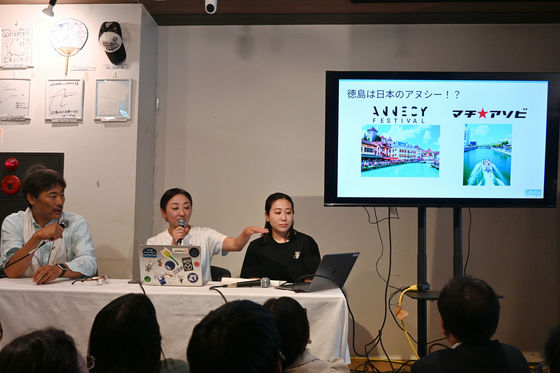
(Applause from the audience)
Kawaguchi:
Is Annecy a lake?
Onishi:
There are lakes and canals.
Kawaguchi:
Tokushima has a river, too. And the food, water, and sake are delicious in both Annecy and Tokushima. And if you come here, you can meet everyone. Industry colleagues who are too busy to meet in Tokyo can hang around here, so you can meet them. I just had a small meeting here, and it's the same in Annecy. Everyone gathers together, so you can do business.
Onishi:
Since everyone there is in the industry, I think I'll be able to meet and have a relaxed conversation.
Kawaguchi:
So, that was the day I felt that we must protect 'Machi★Asobi' for the sake of Japanese animation... Wow, exactly one hour.
(Big applause)
Kawaguchi:
Thank you for your attention.
Related Posts:







